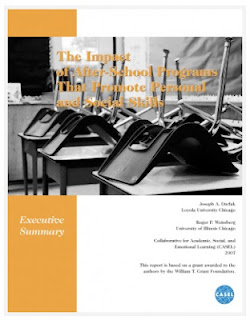By Sam Piha
 |
| Joseph Durlak |
Joseph Durlak and his team have produced some seminal studies that examine the impact of in-school and afterschool programs that promote social-emotional learning. Two of his most important studies offered a meta-analysis, examining high-quality evaluations of the programs and their many effects on youth outcomes. We urge the readers to review these studies when reflecting on the implementation of their own programs. Readers should also visit the Collaborative for Academic, Social, and Emotional Learning (CASEL) website. Below we offer a brief interview with Dr. Durlak.
Q: In partnership with a number of your colleagues, you conducted two meta-analyses regarding the effectiveness in school and after school efforts to promote social-emotional learning. Can you briefly explain what is meant by social-emotional learning and competencies?
A: In brief, social and emotional learning (or SEL) focuses on the systematic development of a core set of five interrelated social, cognitive, emotional, and behavioral competencies that help children more effectively handle life challenges and thrive in both their learning and their social environments. These skills fall into five areas: self-awareness, self-management, social awareness, relationship skills, and responsible decision making. Representative competencies in these areas include the abilities to recognize and manage emotions, set and achieve positive goals, appreciate the perspectives of others, establish and maintain positive relationships, make responsible decisions, and handle interpersonal situations constructively (Collaborative for Academic, Social, and Emotional Learning, 2013).
Q: In your research you were interested in whether youth gained social-emotional competencies and whether this had an impact on school behavior and academic success. What did you learn?
A: Overall, we found that the 213 programs that we evaluated were successful in improving students functioning in all six of the outcome areas we examined.
In perhaps the most important finding, programs were able to improve students’ academic performance (grades and test scores) to a degree that corresponds to an 11% percentile gain in academic performance. This type of gain corresponds to what many educational interventions have been able to do based on other evaluative research. SEL Programs also significantly improved students’ self-perceptions, their social and emotional skills, and their prosocial attitudes (e.g., toward school ) and significantly reduced levels of conduct problems and emotional distress (e.g., symptoms of anxiety and depression).
Q: In these studies, the effectiveness of these efforts were conditional on the quality of the implementation. You identified some key characteristics of implementation that were vital to the program’s success. Can you briefly describe these characteristics?
A: Extensive research on both children and adults suggests that skills training is most effective when certain principles are followed. Many of these principles are consistent with educational research on effective teaching practices.
 We found that four characteristics representing four of these principles were associated with programs that were more effective than others. We constructed the acronym, SAFE, to capture these features. ‘S’ stands for Sequential, meaning that programs had a carefully sequenced plan that was designed to develop SEL skills. This was usually accomplished by a specific curriculum or protocol that built competencies in a coordinated, step-by-step fashion. ‘A’ stands for Active and means that active forms of learning involving practice and feedback were used to develop skills. Hands-on learning followed by constructive feedback leads to skills acquisition. ‘F’ stands for Focused, meaning that sufficient time was set aside exclusively for skill training, ‘E’ stands for Explicit and means that the skills targeted in each program were clearly explained to students so they knew what was expected of them.
We found that four characteristics representing four of these principles were associated with programs that were more effective than others. We constructed the acronym, SAFE, to capture these features. ‘S’ stands for Sequential, meaning that programs had a carefully sequenced plan that was designed to develop SEL skills. This was usually accomplished by a specific curriculum or protocol that built competencies in a coordinated, step-by-step fashion. ‘A’ stands for Active and means that active forms of learning involving practice and feedback were used to develop skills. Hands-on learning followed by constructive feedback leads to skills acquisition. ‘F’ stands for Focused, meaning that sufficient time was set aside exclusively for skill training, ‘E’ stands for Explicit and means that the skills targeted in each program were clearly explained to students so they knew what was expected of them.
Aside from these four program characteristics, we also found that programs that were associated with better implementation were more effective than those that experienced problems with implementation. Implementation involves several dimensions but basically refers to the extent to which intended programs are conducted as planned.
In other words, effective SEL programs are both well-designed from the start and well executed when they are put into action.
Q: There is growing discussion of the importance of non-cognitive skills. How are these non-cognitive skills related to the SEL skills that are promoted by the Collaborative for Academic, Social, and Emotional Learning (CASEL)?
A: In general, there is now growing evidence that success in school and later life is not dependent solely on one’s cognitive or intellectual abilities. The different domains of functioning are not independent. We have shown that fostering students’ personal and social development via SEL programs can also improve their academic development.
Q: The LIAS project is promoting 5 key principles that we should apply in our afterschool and summer programs: learning that is active, collaborative, meaningful, supports mastery, and expands horizons. Can you say a bit about the relevance of these principles and how they overlap, or not with social-emotional learning?
A: There is considerable overlap and sometimes only the terms are different. For example, learning that is active and that supports mastery relates to both the ‘A’ and ‘F’ of our acronym in that students need to practice new skill and we must devote sufficient time and attention to foster student mastery.
The LIAS principles of collaboration, meaningfulness, and expanded horizons are each consistent with the types of skills that compose SEL such as skills relating to managing one’s emotions, developing and maintaining satisfactory relationships with others, and enhancing self-awareness. In general, the LIAS principles and the five SEL domains allows flexibility and adaptations to occur for work with different types of youth at different developmental stages, and with different needs and interests.
___________________________
Joseph Durlak is Emeritus Professor of Clinical Psychology at Loyola University, Chicago. He currently lives in Santa Fe. New Mexico, where he remains active writing, editing, consulting, and reviewing. His primary interests are in prevention programs for children and adolescents, meta-analysis, community psychology, and social and emotional learning programs. He has published major reviews on prevention programs for youth, after-school programs, program implementation, and school-based social and emotional learning programs. He is currently editing contributions for the Handbook of Social and Emotional Learning, to be published by Guilford in late 2013.





























